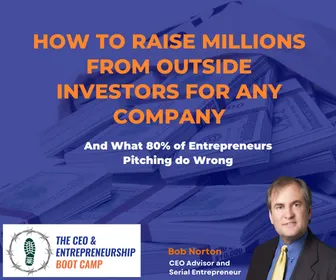What Kind of Team Do You Need to Raise Outside Funding?
Most investors prioritize the management team when considering investment opportunities. As the saying goes, “A good team will likely fix any problem.” However, accurately assessing and objectively rating a team’s capabilities can be challenging. To improve and understand the current state of a team, it is crucial to quantify its strengths and weaknesses.
In the startup world, it’s common for over ninety percent of teams to be insufficient for securing outside financing. Recognizing this reality and devising a plan for hiring can help overcome this obstacle. Building a strong management team is not only the foundation of any company but also the key to navigating the numerous challenges that arise in the early years of a venture.
Many individuals mistakenly believe they have a “strong” team. Unfortunately, they are often wrong, not because of dishonesty but due to their limited perspective based on their own past achievements. Most people have never been part of a top-performing management team. Falsely claiming a strong team can hinder the chances of securing investment from sophisticated investors. Understanding where a company is weak is crucial because nothing is more dangerous than being unaware of one’s weaknesses.
The specific talents and expertise required for launching or growing a business vary depending on the nature of the enterprise. However, it is safe to say that businesses aiming for several million dollars in annual sales will need individuals with ten to twenty years of experience in risk management and innovation. Additionally, strong creativity and management skills are essential for reaching such revenue levels.
A common misconception is that a person with a good idea can single-handedly build a successful company. In reality, this is far from true. Behind any significant success, there are years of trial and error, adaptation, and learning, or the recruitment of seasoned professionals with extensive management experience. Founders may remain as the face of the company, but they rely on a management team with diverse skills and decades of collective experience. Even renowned figures like Zuckerberg, Gates, and Elon Musk did not achieve success alone. They all encountered challenges, learned valuable lessons, and attracted talented individuals to complement their own weaknesses.
It is important to note that no one is expected to possess all the necessary skills. A complementary team is indispensable. Trying to build a successful company with only one person is akin to constructing a skyscraper with just a mason, carpenter, or electrician. Unless a company can be effectively run with fewer than seven people, the principles of team building outlined here apply. Lifestyle companies managed solely by their founders can be created without an extensive talent pool, but they are unlikely to exceed a few million dollars in sales. Furthermore, selling such a company or attracting serious capital becomes significantly more challenging. While there is nothing inherently wrong with building a lifestyle company, its potential will always be a fraction of what can be achieved with a high-growth company.
Learn more about our Growth and Scaling (GSP) Certification program for Managers, click here
“Steve Jobs got fired from Apple before he learned to be a CEO. And most simply put in the decade or more to learn the arts of management, leadership, marketing, innovation, and finance to become successful Entrepreneurs decades into their careers. There are no shortcuts here.” – Famous Management Guru
Founders must possess a vision of the future that can attract top talent and capital. This goes beyond simply telling a story; it requires a comprehensive understanding of the business’s potential.
In a business context, each row represents a critical area of operation. While any area can cause a business to fail, product development and marketing are typically the riskiest. Success in these areas demands significant expertise. As Peter Drucker, The Father of Management, once said, “A company only has two main functions: marketing and innovation.” This rings true since other skills tend to be more commoditized and require minimal creativity.
Founders also need a vision of the future to sell to attract strong talent and capital.
Some call this the “story” but this is an oversimplification.
Let’s walk through the basics of this model, though the many other uses and deep understanding would require a full course. You can also see a free course preview video here.
In this Skills Set Matrix™, each column represents a career experience level. On average, it takes around five years to gain the necessary knowledge to master a single “cell” in this matrix. In larger companies, these columns align with traditional titles and roles. However, startups often require individuals to take on multiple roles simultaneously. For instance, in software product development, the columns would typically include the Vice President of Engineering, Director of Software Development, Manager of Software Development, Chief Architect, and Software Engineer. Variations and subtle gradations may exist, depending on the company.
When a company lacks a history of financial performance, institutional investors view it differently. To secure significant external capital, such as over $2 million, a Level 8 to 10 team is typically required. For seed funding from angel investors, a Level 5 team is often necessary. Some may resort to raising funds from friends and family with a Level 1 team, although this is unlikely to impress potential investors. Demonstrating personal investment helps signal commitment during challenging times.
Entrepreneurs should understand that the initial round of funding is intended to build a team, not just a product. Simply having a product is not sufficient. Most risks lie in areas such as marketing, sales, and scaling. The path from idea to success, whether through an IPO, reaching $2 million in revenue, or selling the company, is arduous and filled with challenges. Entrepreneurs must acknowledge this reality and prepare accordingly. Every startup is a marathon, not a sprint.
Now for the bad news. For companies to bring in outside capital of any significant size, let’s say over $2 million, you will need a Level 8 to 10 team. For a seed round from angel investors of $250K or more, you will likely need a Level 5 team. Many will raise money from friends and family (and fools) with a Level #1 team. This will not impress anyone, but “skin in the game” always helps future investors know there is a cost of throwing in the towel during the inevitable rough times.
For a free video consultation call on what your company and team need to scale better, click here

Free Webinar Replay
How to Raise Millions from Outside Investors for any Company – Learn the 30 other sources of capital beyond angel and VC and how to prepare a company and get it into the top few percent investors see.
For a free video consultation call on what your company and team need to scale better, click here
It is understandable that some readers might feel disheartened by the realization that raising money is more challenging than anticipated. Media coverage often highlights successful deals, obscuring the multitude of failures. However, recognizing these difficulties in advance is the best way to prepare. Personally, I spent three years or more preparing to launch my first company, knowing that it would eventually happen. Building skills throughout your career is crucial, and understanding the significance of a well-rounded team is paramount. A team capable of addressing innovation, risks, and operational needs is indispensable. Building a substantial company requires a significant vision, typically generating revenues of at least $10 million for angel investors and $100 million or more for institutional capital. Investors naturally prioritize larger opportunities to compensate for the high risk inherent in investing in new companies.
Bob Norton is a long-time Serial Entrepreneur, CEO and investor who founded six companies with four exits that returned over $1 billion to investors for a 25X ROI. Two others are still in development. He has trained, consulted and advised thousands of Entrepreneurs, CEOs and boards since 2002. Mr. Norton works with companies to 2X to 10X growth rates and valuation using AirTight Management™, the world’s most comprehensive Leadership Operating System. He also helps companies raise capital to fund growth. He is also the Founder of The CEO Boot Camp™ and Entrepreneurship University™ for early-stage companies that have not reached product-market fit and $1M ARR.
What can we help you with today? Scaling, training, consulting, coaching?
Call (619) SCALE06 or (619) 722-5306 9am-6pm CT
Or Schedule a free 30-minute strategy session by clicking here.



